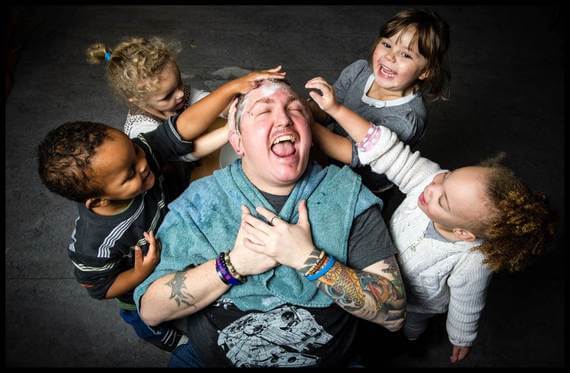
“Do Men in Childcare Matter”? What Do the Children Say?
Every year we have the LEYF annual debate, named in honour of Margaret Horn, student of Octavia Hill and the first paid director of what was then a local…
August 20th 2012
Not so long ago, David Stevens, Manager of the Angel Nursery, which for a while had 4 male staff out of a team of five, represented us at the Men in Childcare conference in Edinburgh. He had already been to the Men in Childcare Network Ireland International Conference, where he was the only UK representative and had to cope with the high jinks of the Irish and the Danes and the Scots! Enough said. Since then he has become even more interested in why there should be men in childcare and constantly urges me not to take it off the radar.
David and I have long questioned the actual reasons for having men in childcare. We are less than impressed by the standard responses we hear across the sector. The usual reasons trotted out are all about fear and barriers to entry. These include poor pay, lack of promotion opportunities, poor status, fear of accusations of abuse and paedophilia, discomfort working in such a highly female work environment and an expectation that one man can address the shortfall of positive male roles in so many children’s lives. Reading that would you want to come into childcare?
David feels all of this detracts from the main question which is “Do you want to work with children?” When speaking to our male LEYFstaff (of which there are 8% of the workforce) we found that they had all come into childcare because they thought they could be good Early Years Practitioners. For them being a sole man in a nursery was probably the biggest barrier and so we now try and place two men in each nursery, though this is not always possible. Generally, the men working at LEYF were both annoyed and depressed that all the talk of men in childcare became negative and focused on barriers to entry. Many reiterated that they always wanted to work with small children and that what we should be looking for is men who want to work with small children because they are interested in child development and how children learn and they think they have the ability to give them a really fun and exciting experience. The same argument or scenario does not play out in the Primary Schools as men ride up glass elevators to senior management and headteacher positions before you can say supercalifragilisticexpialidocious.
David has been involved with some very interested organisations drawn together by the Daycare Trust with the support of the DfE. However unlike Europe where Manner in Kitas received 14 million euros for theory based research into the benefit of men in childcare we are doing this on the usual barter and free gratis approach. Europe is also focusing on gender and equality issues which I think would be interesting and avoid us falling into the usual knee-jerk response that until men really take a hold in childcare we will see no improvements in pay or status. How depressing is that for a female led sector? What is needed is for the whole sector to be understood by the public and that policy makers help shape policies which assist the public to understand what we do… yes it’s more than smiling, washing hands and being patient while our male colleagues play really good rough and tumble while acting as surrogate uncle to all the children in female led families!
So here is what we are going to do:
Men in Childcare is one aspect of a much bigger question which is what is the role of men in our society today? It’s certainly changing at different social, economic and political levels so let’s weave this into a much more comprehensive debate.

Every year we have the LEYF annual debate, named in honour of Margaret Horn, student of Octavia Hill and the first paid director of what was then a local…
Recently, I wrote about the importance of visiting other nurseries so I was delighted when I was given a “golden ticket” by Community Playthings to visit…
The Government made childcare a central component of its election manifesto. Mr Cameron insists that his Government will extend the childcare ‘free offer’ to 30 hours a week, 38 weeks…